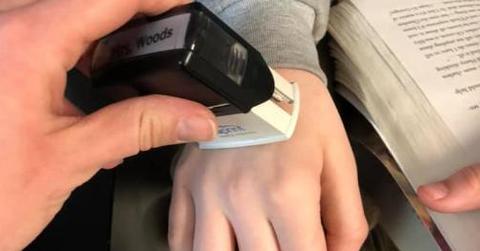Teacher's 'Hack' to Make Sure Kids are Washing Their Hands Amid Coronavirus Outbreak Is Genius
Updated March 13 2020, 12:25 p.m. ET

Getting kids to wash their hands can be difficult at the best of times. But when there's a global coronavirus outbreak that has infected more than 1,000 and killed 31 people in the United States, then good hygiene in schools becomes even more important.
But one teacher has found a pretty creative way to make sure her kids are washing their hands correctly. Shauna Woods, a third-grade teacher at Hallsville Schools in Hallsville, Missouri, shared a photo of her 'hack' on Facebook and it's since gone viral.
"We always experience a spike in illness and absentees this time of year due to different viruses and the common cold," Woods told Good Morning America. "It's a fact of life that many kids are in close corners, interacting with one another all day. They share many things, including germs."
To entice her kids to scrub their hands a little harder, Woods stamps them. "We are doing our best in room 550 to keep the germs away," Woods explained. "Students got stamps on their hands this morning. If it’s gone by the end of the day from washing their hands, they get a prize."
"I've had a 'Mrs. Woods' stamp for years and have used it to stamp my classroom books," Woods explained. "I decided to grab that on a Monday morning, told students to wash their hands in the classroom sink and then come see their teacher -- this was their morning work as we call it. I put the stamp on their hands and they were sold when I told them prizes were involved."
While kids initially wanted to get the stamp rubbed off as quickly as possible, defeating the point of washing their hands regularly throughout the day, Woods says that the kids soon got the point.
"Once we went over the expectations and purpose, it became a routine for all of my students," she said. "Each morning since then, they get their stamp and go about their day. I check for their stamp at the end of the day, and if it's faded or gone, they get their prize."
Woods called the idea a "great motivator" that encourages kids to learn that they should be washing their hands regularly.
"Let's be honest, some student's biggest worry is if they'll get to recess on time," Woods said. "Providing a visual reminder and incentive has boosted their hygiene regiment. I even joined in on the fun and put a stamp on my hand to be their positive role model."
Parents seemed to love the idea, with one saying: "I'm stamping my own kid with this idea in mind every morning. Thanks."
While another added: "Great idea!! I can’t wait to see if Lane still has a stamp!!"
The Centers for Disease Control and Prevention have issued the following the advice when it comes to protecting yourself and others from coronavirus:
Clean your hands often
- Wash your hands often with soap and water for at least 20 seconds especially after you have been in a public place, or after blowing your nose, coughing, or sneezing.
- If soap and water are not readily available, use a hand sanitizer that contains at least 60% alcohol. Cover all surfaces of your hands and rub them together until they feel dry.
- Avoid touching your eyes, nose, and mouth with unwashed hands.
Avoid close contact
- Avoid close contact with people who are sick
- Put distance between yourself and other people if COVID-19 is spreading in your community. This is especially important for people who are at higher risk of getting very sick.
Stay home if you’re sick
- Stay home if you are sick, except to get medical care. Learn what to do if you are sick.
Cover coughs and sneezes
- Cover your mouth and nose with a tissue when you cough or sneeze or use the inside of your elbow.
- Throw used tissues in the trash.
- Immediately wash your hands with soap and water for at least 20 seconds. If soap and water are not readily available, clean your hands with a hand sanitizer that contains at least 60% alcohol.
Wear a facemask if you are sick
- If you are sick: You should wear a facemask when you are around other people (e.g., sharing a room or vehicle) and before you enter a healthcare provider’s office. If you are not able to wear a facemask (for example, because it causes trouble breathing), then you should do your best to cover your coughs and sneezes, and people who are caring for you should wear a facemask if they enter your room. Learn what to do if you are sick.
- If you are NOT sick: You do not need to wear a facemask unless you are caring for someone who is sick (and they are not able to wear a facemask). Facemasks may be in short supply and they should be saved for caregivers.
Clean and disinfect
- Clean AND disinfect frequently touched surfaces daily. This includes tables, doorknobs, light switches, countertops, handles, desks, phones, keyboards, toilets, faucets, and sinks.
- If surfaces are dirty, clean them: Use detergent or soap and water prior to disinfection.
The best way to prevent contracting or spreading coronavirus is with thorough hand washing and social distancing. If you feel you may be experiencing symptoms of coronavirus, which include persistent cough (usually dry), fever, shortness of breath, and fatigue, please call your doctor before going to get tested. For comprehensive resources and updates, visit the CDC website. If you are experiencing anxiety about the virus, seek out mental health support from your provider or visit NAMI.org.